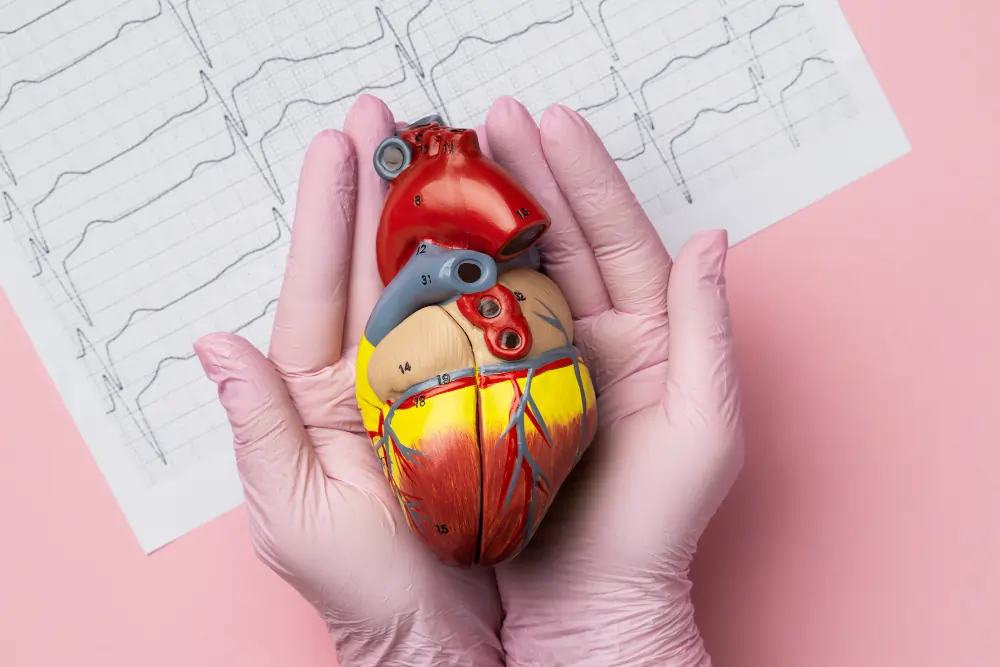
Introduction
Welcome to our comprehensive guide on chronic heart disease! In this article, we will delve into the essential facts surrounding this prevalent condition, shedding light on its causes, symptoms, prevention, and treatment options. Whether you’re seeking to expand your knowledge or are personally affected by chronic heart disease, this article aims to provide valuable insights and actionable information. So, let’s get started!
1. What is Chronic Heart Disease?
At its core, chronic heart disease, also known as coronary artery disease, refers to the gradual buildup of plaque in the arteries that supply blood to the heart. This accumulation narrows the arteries, restricting proper blood flow and oxygen delivery to the heart muscles. As a result, the heart may not receive the necessary nutrients, potentially leading to various complications and serious health risks. Coronary heart disease (CHD) is a major cause of death in the UK and worldwide. CHD is sometimes called ischaemic heart disease or coronary artery disease.
Video: coronary artery disease
2. How Does Chronic Heart Disease Develop?
The development of chronic heart disease is influenced by a combination of factors, including lifestyle choices and genetic predisposition. Conditions like high blood pressure, high cholesterol levels, smoking, obesity, and diabetes can contribute to the formation of plaque in the arteries over time. Additionally, a sedentary lifestyle, poor diet, and excessive stress can also contribute to the onset and progression of this condition.
3. What are the Symptoms of Chronic Heart Disease?

Symptoms of chronic heart disease can vary from person to person. Common signs include chest pain or discomfort, shortness of breath, fatigue, palpitations, and dizziness. It’s important to note that some individuals may not exhibit any noticeable symptoms until the disease has progressed significantly. Regular check-ups and monitoring of risk factors are crucial to catch any potential issues early on.
4. What are the Risk Factors for Chronic Heart Disease?
Several risk factors contribute to the development of chronic heart disease. These include age, family history, high blood pressure, high cholesterol levels, smoking, obesity, diabetes, and a sedentary lifestyle. By addressing and managing these risk factors, individuals can significantly reduce their chances of developing chronic heart disease.
5. How is Chronic Heart Disease Diagnosed?
To diagnose chronic heart disease, healthcare professionals utilize various methods. These may include a physical examination, analysis of medical history, conducting blood tests, electrocardiograms (ECGs), stress tests, and cardiac catheterization. By employing these diagnostic tools, doctors can accurately assess the severity of the condition and develop appropriate treatment plans.
6. Can Chronic Heart Disease Be Prevented?
Although chronic heart disease is a prevalent condition, it can often be prevented or its progression slowed by adopting a heart-healthy lifestyle. Lifestyle changes may involve quitting smoking, maintaining a balanced diet low in saturated fats, cholesterol, and sodium, engaging in regular physical activity, managing stress, and controlling underlying health conditions such as high blood pressure and diabetes.
7. Treatment Options for Chronic Heart Disease

Treatment options for chronic heart disease primarily focus on alleviating symptoms, improving heart function, and managing associated risk factors. Lifestyle modifications play a crucial role, along with medication management that may include beta-blockers, antiplatelet drugs, and lipid-lowering medications. In severe cases, surgical interventions such as angioplasty, stents, or bypass surgery may be necessary to restore proper blood circulation.
8. How Can Lifestyle Changes Positively Impact Chronic Heart Disease?
Implementing positive lifestyle changes is key to managing chronic heart disease effectively. Regular exercise helps strengthen the heart and improve overall cardiovascular health. Adopting a heart-healthy diet low in saturated fats, cholesterol, and sodium helps maintain a healthy weight and control blood pressure. It’s essential to work closely with healthcare professionals to tailor lifestyle changes to individual needs.
9. Emotional Well-being and Chronic Heart Disease
Chronic heart disease not only affects physical health but can also impact an individual’s emotional well-being. The lifestyle adjustments, medication regimens, and uncertainties surrounding the condition may lead to stress, anxiety, and depression. Engaging in support groups, therapy, and discussing concerns with healthcare providers are all vital components in managing emotional well-being alongside physical health.
10. Living a Fulfilling Life With Chronic Heart Disease
While managing chronic heart disease requires diligence, it doesn’t diminish a person’s ability to live a fulfilling life. With appropriate treatment, regular check-ups, and a positive mindset, individuals can continue to engage in their favorite activities, pursue hobbies, maintain relationships, and enjoy life to the fullest. Staying motivated, educated, and supported is key to maintaining a high quality of life despite the condition.
Conclusion
Chronic heart disease is a prevalent condition that affects countless individuals worldwide. By understanding the essential facts surrounding this disease, individuals can take proactive steps to prevent its onset or manage it effectively. Lifestyle modifications, regular medical check-ups, and adherence to prescribed treatment plans play a significant role in maintaining heart health. Remember, awareness and education are crucial in combatting chronic heart disease and promoting a healthy heart.
FAQs
1. Can children develop chronic heart disease?
Chronic heart disease typically affects adults, but certain congenital heart conditions may be present from birth and require lifelong management.
2. How can I lower my risk of developing chronic heart disease?
Lowering the risk involves quitting smoking, maintaining a healthy weight, regular exercise, managing stress, and keeping blood pressure and cholesterol levels under control.
3. Are there alternative treatments for chronic heart disease?
While lifestyle changes and medical management are integral, alternative treatments like acupuncture or meditation may be utilized as complementary approaches, but their effectiveness varies from person to person.
4. Can chronic heart disease be cured completely?
While chronic heart disease cannot be completely cured, implementing lifestyle changes, adhering to treatment plans, and managing risk factors can significantly improve heart health and overall well-being.
5. Is a heart-healthy diet beneficial for everyone, regardless of heart disease status?
Absolutely! Maintaining a heart-healthy diet is beneficial for everyone, as it promotes overall cardiovascular health and helps prevent the development of chronic heart disease.



 Afrikaans
Afrikaans Albanian
Albanian Amharic
Amharic Arabic
Arabic Armenian
Armenian Azerbaijani
Azerbaijani Basque
Basque Belarusian
Belarusian Bengali
Bengali Bosnian
Bosnian Bulgarian
Bulgarian Catalan
Catalan Cebuano
Cebuano Chichewa
Chichewa Chinese (Simplified)
Chinese (Simplified) Chinese (Traditional)
Chinese (Traditional) Corsican
Corsican Croatian
Croatian Czech
Czech Danish
Danish Dutch
Dutch English
English Esperanto
Esperanto Estonian
Estonian Filipino
Filipino Finnish
Finnish French
French Frisian
Frisian Galician
Galician Georgian
Georgian German
German Greek
Greek Gujarati
Gujarati Haitian Creole
Haitian Creole Hausa
Hausa Hawaiian
Hawaiian Hebrew
Hebrew Hindi
Hindi Hmong
Hmong Hungarian
Hungarian Icelandic
Icelandic Igbo
Igbo Indonesian
Indonesian Irish
Irish Italian
Italian Japanese
Japanese Javanese
Javanese Kannada
Kannada Kazakh
Kazakh Khmer
Khmer Korean
Korean Kurdish (Kurmanji)
Kurdish (Kurmanji) Kyrgyz
Kyrgyz Lao
Lao Latin
Latin Latvian
Latvian Lithuanian
Lithuanian Luxembourgish
Luxembourgish Macedonian
Macedonian Malagasy
Malagasy Malay
Malay Malayalam
Malayalam Maltese
Maltese Maori
Maori Marathi
Marathi Mongolian
Mongolian Myanmar (Burmese)
Myanmar (Burmese) Nepali
Nepali Norwegian
Norwegian Pashto
Pashto Persian
Persian Polish
Polish Portuguese
Portuguese Punjabi
Punjabi Romanian
Romanian Russian
Russian Samoan
Samoan Scottish Gaelic
Scottish Gaelic Serbian
Serbian Sesotho
Sesotho Shona
Shona Sindhi
Sindhi Sinhala
Sinhala Slovak
Slovak Slovenian
Slovenian Somali
Somali Spanish
Spanish Sundanese
Sundanese Swahili
Swahili Swedish
Swedish Tajik
Tajik Tamil
Tamil Telugu
Telugu Thai
Thai Turkish
Turkish Ukrainian
Ukrainian Urdu
Urdu Uzbek
Uzbek Vietnamese
Vietnamese Welsh
Welsh Xhosa
Xhosa Yiddish
Yiddish Yoruba
Yoruba Zulu
Zulu